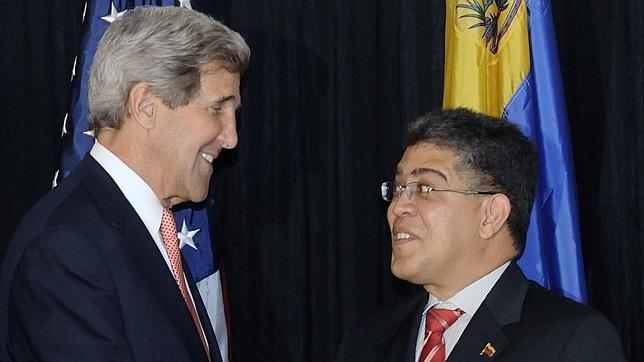
U.S. takes reprisals against Venezuela; warns against asylum for Snowden

WASHINGTON – The United States has already begun actions to pressure Venezuela not to welcome the former employee of U.S. intelligence Edward Snowden. Earlier this month, Washington revoked the entry visas for high-ranking officials of the Venezuelan government and businessmen linked with Chavism.
Additionally, in a telephone call, U.S. Secretary of State John Kerry warned his Venezuelan counterpart, Elías Jaua, of other measures that the U.S. will apply if asylum is given to Snowden, such as a suspension of the sale of gasoline and petroleum derivatives to the Caribbean country, products vital to maintain daily activities in Venezuela.
Kerry phoned Jaua on the night of Friday, July 12, hours after Snowden announced that he would accept the poliltical asylum offered by Venezuela, although he expressed his temporary inability to travel to that country.
In harsh language, as described by sources familiar with the conversation, Kerry conveyed to Jaua the extreme importance that the U.S. attaches to this affair and warned that any Venezuelan aircraft that is suspected to carry Snowden will be forbidden to enter the air space of the United States or any other country member of NATO.
Kerry indicated that if Snowden traveled in President Nicolás Maduro’s plane there would be no repetition of the [detour imposed on] Bolivia’s president, Evo Morales, because of the diplomatic upheaval that was generated, but Maduro would have to go fetch Snowden in person.
“Immunity would be given not to the plane but to the president,” Kerry allegedly said, according to the sources.
The tone was quite different from the smiling encounter staged by the two politicians in Guatemala in June, at the General Assembly of the Organization of American States, when it seemed that relations between the two nations were improving and might lead to an exchange of ambassadors. An open conflict between Washington and Caracas would freeze the United States’ definitive recognition of Maduro’s triumph at the polls.
The revocation of visas to high-ranking Venezuelan officials and businessmen who do major business with that government became effective on July 11, when some of them began to receive notifications from the U.S. Embassy in Caracas. The measure, which does not affect the short-term visas commonly granted to Venezuelan tourists, would force the affected businessmen and politicians to pressure President Maduro to retract his offer of asylum to the U.S. fugitive.
The U.S. also threatened to cancel the sale to Venezuela of gasoline and other petroleum derivatives. Although Venezuela is a major producer and exports petroleum to the U.S., it requires oil products that are more refined or processed. Every month, Venezuela buys from the U.S. 500,000 barrels of gasoline and an equal amount of “bunker oil,” used as fuel for thermoelectrical plants. It also buys 350,000 barrels of MTBE [methyl tertiary butyl ether], an additive that raises the octane number of gasoline and is an essential element for Venezuelan vehicles.
As possible actions, the sources also mentioned the formalization of charges against Chavist leaders who Washington claims are involved in drug trafficking, money laundering and other criminal acts. Kerry allegedly mentioned some specific names during his conversation with Jaua.
The fear in Washington is that Snowden could take advantage of temporary asylum in Russia to leave the Moscow airport where he now lives and find refuge in the Venezuelan Embassy in Moscow, or to travel to another Russian city from which he could more easily fly to Caracas. If he left from Vladivostok, a Russian city on the Pacific coast, for example, he could make a single stopover in Nicaragua, thus avoiding entering the air space of other countries.
A trip like that could be made only by Maduro’s presidential aircraft, because the planes flown by the oil company PDVSA are smaller (DC Falcons 9000, like Evo Morales’ presidential plane). Only a tanker of the Venezuelan Air Force, a Boeing 707, could travel that distance without refueling, but it is unlikely that the Venezuelan military would risk such a direct confrontation with Washington.
(From the Spanish daily ABC. Translation by Progreso Weekly.)
Related articles:
What did John Kerry say? (Editorial from La Alborada)
U.S. also turns down Moscow’s extradition requests (Russia Today)

